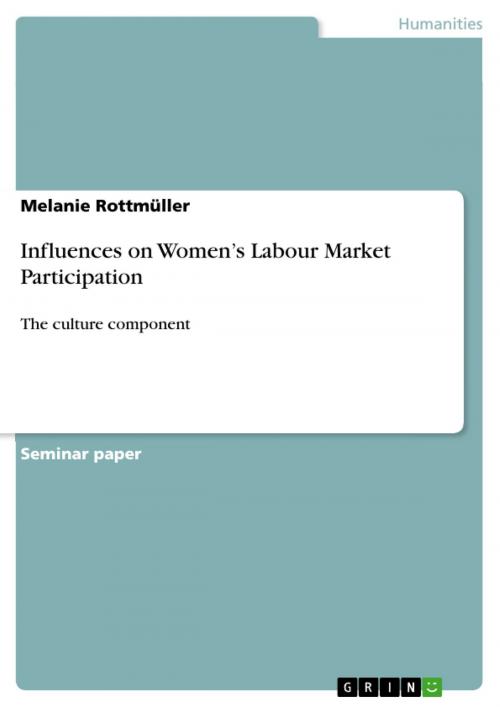Influences on Women's Labour Market Participation
The culture component
Nonfiction, Social & Cultural Studies, Social Science, Sociology| Author: | Melanie Rottmüller | ISBN: | 9783640197613 |
| Publisher: | GRIN Publishing | Publication: | October 28, 2008 |
| Imprint: | GRIN Publishing | Language: | English |
| Author: | Melanie Rottmüller |
| ISBN: | 9783640197613 |
| Publisher: | GRIN Publishing |
| Publication: | October 28, 2008 |
| Imprint: | GRIN Publishing |
| Language: | English |
Seminar paper from the year 2007 in the subject Sociology - Gender Studies, grade: 1,3, University of Bamberg, course: Educational Systems and Labour Markets in Europe, 14 entries in the bibliography, language: English, abstract: This study analizes Labour market participation and related cultural components in three countries. In Germany a male breadwinner model is found. Men's activity rate is much higher than the one of women. Reservations have to be made when speaking about a female part-time carer. The percentage of women working part-time is less than the half of women working full-time and women doing housework are even more than women working part-time. There is also some conflict towards the Dutch dual breadwinner/ dual carer model. The rate of women working part-time is in fact the highest in the Netherlands and also the percentage of men working part-time is higher than for Germany or even Finland, still there is no equal participation in the labour market and therefore no dual breadwinner model, at most a tendency towards. Lastly, Finland's women are by far most integrated into the labour market when speaking of full-time employment, but speaking of full and equal integration of both sexes and therefore a dual breadwinner model is exaggerated. As regards attitudes, the total explained variance and homogeneity of factor gives some indication that there is convergence of attitudes which seems to increase when more 'liberal' countries, younger respondents and women are concerned. A factor analysis showed that the importance of traditional family design is highest in Germany and least in the Netherlands, whereas affirmation of equal division of labour between the genders was highest in the Netherlands and lowest in Germany. Altogether, the analysis of attitudes (and the employment status) does with some reservations confirm the findings of Pfau-Effinger.
Seminar paper from the year 2007 in the subject Sociology - Gender Studies, grade: 1,3, University of Bamberg, course: Educational Systems and Labour Markets in Europe, 14 entries in the bibliography, language: English, abstract: This study analizes Labour market participation and related cultural components in three countries. In Germany a male breadwinner model is found. Men's activity rate is much higher than the one of women. Reservations have to be made when speaking about a female part-time carer. The percentage of women working part-time is less than the half of women working full-time and women doing housework are even more than women working part-time. There is also some conflict towards the Dutch dual breadwinner/ dual carer model. The rate of women working part-time is in fact the highest in the Netherlands and also the percentage of men working part-time is higher than for Germany or even Finland, still there is no equal participation in the labour market and therefore no dual breadwinner model, at most a tendency towards. Lastly, Finland's women are by far most integrated into the labour market when speaking of full-time employment, but speaking of full and equal integration of both sexes and therefore a dual breadwinner model is exaggerated. As regards attitudes, the total explained variance and homogeneity of factor gives some indication that there is convergence of attitudes which seems to increase when more 'liberal' countries, younger respondents and women are concerned. A factor analysis showed that the importance of traditional family design is highest in Germany and least in the Netherlands, whereas affirmation of equal division of labour between the genders was highest in the Netherlands and lowest in Germany. Altogether, the analysis of attitudes (and the employment status) does with some reservations confirm the findings of Pfau-Effinger.















